11.29.06 Reviews
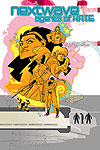 Nextwave: Agents of HATE #10 (Marvel): Grade A+. That's all you really need to know, so let's cut right to the muthafuckin' chase... Grade A+. A+. A+. In fact... Amen, Brother Ellis! Stuart Immonen's art is on fire, perfectly capturing the manic sense of fun and irreverent scripting that Ellis brings to the party. Not only does he do that, he does it half a dozen times, with as many different artistic styles that capture the moods of 1960's/70's superhero faire and Mignola-inspired monster/horror genre-blenders, just to name a couple personal faves. "It fires joy from a better universe - pure beams of transformative epiphany." Yes, it does indeed. It finally hit me that this version of Machine-Man is basically Inspector Gadget on crack. Tabitha wins the fight. Why? Because she's stupid and has no brain. Forbush's powers transport the mind; and she has none. Brilliant. "I am mighty with girls! They make all the right noises and ruin my bed linen and everything!" This book makes all the right moves and ruins all others. Just when I think Ellis & Immonen are going to be one-trick ponies on this book (albeit already strong one-trick ponies), they go and flip the meta-commentary switch into overdrive, ala Automatic Kafka or Flex Mentallo, and start riffing on the industry. "Behold Forbush-vision" is really Ellis' way of saying look how I pulled together all these disparate threads of characters that inhabited various mini-multiverses of genre and created the funniest damn "superhero" book. As if that wasn't enough, the tease for #11 had me rolling. The "not" a Civil War crossover issue. "Mark Millar Licks Goats." Off the charts in meeting the literary, artistic, and historical standards. The only negative thing to say about Nextwave is that this run ends with #12. Please let there be another hardcover edition collecting issues 7-12. Please let there be a string of mini-series that are then published regularly. Please! Grade A+.
Nextwave: Agents of HATE #10 (Marvel): Grade A+. That's all you really need to know, so let's cut right to the muthafuckin' chase... Grade A+. A+. A+. In fact... Amen, Brother Ellis! Stuart Immonen's art is on fire, perfectly capturing the manic sense of fun and irreverent scripting that Ellis brings to the party. Not only does he do that, he does it half a dozen times, with as many different artistic styles that capture the moods of 1960's/70's superhero faire and Mignola-inspired monster/horror genre-blenders, just to name a couple personal faves. "It fires joy from a better universe - pure beams of transformative epiphany." Yes, it does indeed. It finally hit me that this version of Machine-Man is basically Inspector Gadget on crack. Tabitha wins the fight. Why? Because she's stupid and has no brain. Forbush's powers transport the mind; and she has none. Brilliant. "I am mighty with girls! They make all the right noises and ruin my bed linen and everything!" This book makes all the right moves and ruins all others. Just when I think Ellis & Immonen are going to be one-trick ponies on this book (albeit already strong one-trick ponies), they go and flip the meta-commentary switch into overdrive, ala Automatic Kafka or Flex Mentallo, and start riffing on the industry. "Behold Forbush-vision" is really Ellis' way of saying look how I pulled together all these disparate threads of characters that inhabited various mini-multiverses of genre and created the funniest damn "superhero" book. As if that wasn't enough, the tease for #11 had me rolling. The "not" a Civil War crossover issue. "Mark Millar Licks Goats." Off the charts in meeting the literary, artistic, and historical standards. The only negative thing to say about Nextwave is that this run ends with #12. Please let there be another hardcover edition collecting issues 7-12. Please let there be a string of mini-series that are then published regularly. Please! Grade A+.Powers #21 (Marvel/Icon): Well, it's official. My enthusiasm for reading single issues of this, now sporadically published, title has been officially drained. The repetitive nature of the narrative arcs only fuels the growing ennui toward what used to be one of my favorite titles. I realized that I really only look forward to single issues because of the amusing lettercol, but I can pretty much get that for free online. Yes folks, it is time to "wait for the trade." That considered, this issue suffered heavily from the delay between issues. I found myself asking who the heck are these people? Who the hell is Queen Noir? Why should I care about Teague? Who is the old Iron Fist-looking dude? "Do you kill the Strike?" Umm, was that a typo? Should it have been "Did you kill Strike?" Or was its repetition simply poorly constructed English? These problems really killed any chance at literary context, which saw a slight "bounce of the dead cat" with a cool ending that may implicate the President in the recent murders. Oeming's art still rates quite high on the artistic front, and historically there's just a minor footnote that Bendis has been doing the Superhero Registration Tango here for years. Paging Civil War, Paging Civil War... you saw it here first. Grade B-.
X-Men #193 (Marvel): The book looks really beautiful. Some people criticize Chris Bachalo for cramming too much into a page or panel so that the characters and actions become pushed too closely together and you can't discern much of anything except a tight stack of linework. But, once you train your eye to his style, his figures have a clean nobility and fluid, emotional grace that I enjoy. Bachalo has a way of really capturing the sci-fi/superhero/drama that is X-Men in a post-Claremont (RIP Dave Cockrum) world. There are some bits I really respond to well here, Rogue as a team leader, Emma's telepathic link relaying messages to the team from Scott, Cannonball appearing... anywhere, etc. But, having not read another issue of this arc, umm... Serafina? The "Suncatcher?" Are those Sentinel ONE's? Did rogue and the X-Men team from this book just come from space to the mansion to see the Astonishing line up of X-Men? Whaaaaat? The last issue/summary page didn't help one bit. Come on Mike Carey, gimme just a sound byte of exposition so I know what's up. My fault for jumping in on the last issue of an arc, but still. Literary context is confusing, artistic merit is high, and historical context is nill. Grade C+.
Deathblow #2 (DC/Wildstorm): Mark my words, this title will be cancelled in under a year, or within 12 issues, whichever comes first. Even Brian Azzarello's writing chops and Carlos D'Anda's competent, though not particularly compelling, art will save it. Speaking of artistic context... *ahem* *segue* *cough!* D'Anda's art serves the story, it's sufficiently dark and ominous, and there's the occasional nice use of shadow, but it's in no way innovative. Again, competent, but not impressive by any means. On the literary front, there's a wide delta between compelling intellectual arguments and just poorly crafted language. Azzarello makes a very bold and interesting statement about American (and particularly New York) ethnocentrism. In a world where Israelis deal with terrorist attacks practically daily, "it takes a highly ingrained sense of self-aggrandizement to call a singular terrorist attack ground zero." Now that's not going to win Azz any friends, but it's an extremely cogent point nonetheless. But then, we get lines so awkwardly constructed, "like his legs were made of jello, his feet clay, the rug pulled out beneath him oilcloth, and the floor beneath ice." Yeah, try diagramming that sentence (so, the floor is actually beneath the ice...?).Throw in some talking dogs, Navy SEAL and Black Ops Agent Michael Cray... with *children,* a very confusing last 2 pages, and absolutely no historical context to speak of. Grade C-.
52: Week Thirty (DC): This ranges from almost competent art to laughably stiff poses and preposterous anatomy. Check out the lumpy females in particular with their odd protrusions and uneven, angular breasts. In one panel, Batwoman's thighs are actually wider than her waistline. On the one hand, Dick "Nightwing" Grayson and Tim "Robin" Drake are a sight for sore eyes in this book, but then we get expository dialogue (Bruce still missing, their time abroad in Europe, etc.), odd dialogue (something about the "ten eyed surgeons of the empty quarter" or some shit?), and nearly in character ramblings from Dick (flirty banter with Batwoman and his fondness for redheads). On the Scott Brown "standard-o-meter," this doesn't really pass the literary muster, definitely falls short in the artistic context, but I suppose should receive some credit for historical context based on its inclusion in the grand 52 spectacle. 13 Minutes says Grade D+.
On a side note, I've tried different formulas to try and translate those three categories into numerical weighting (ie: 40% Artistic Context, 40% Literary Context, and 20% Historical Context, or an evenly distributed 33 & 1/3% for each) in order to then calculate a 13 Minutes letter grade, but that mostly just made my brain hurt... Plus, I think assigning scores in that fashion sort of defeats the point of Brown's approach and takes some of the "art" of reviewing (and admittedly, the freewheeling subjectivity) out of the equation. Better to just use his wonderful categories as a reference point.
I also picked up;
Immortal Iron Fist #1 (Marvel): Really looking forward to this book. Fraction is on a roll lately, Aja's pencils look delicious, and this short story was one of the few highlights in the Civil War: Choosing Sides mess that came out a couple weeks ago.
Batman/The Spirit (DC): I realized that aside from Paul Pope's recent Batman: Year 100 project, I haven't picked up a Batman book regularly in years. I think the closest I came was the first 50 or so issues of Nightwing from Dixon and McDaniel a few years back. And although I have owned the first couple of archive editions of Eisner's The Spirit which I perused with surprisingly neutral interest, there's only one reason I bought this - Darwyn Cooke.
Crossing Midnight #1 (DC/Vertigo): I saw a sneak preview or an ad or something for this book a while back and made a mental note to pick it up. When I thumbed through it, I couldn't recall why I actually wanted to buy it, but was feeling financially cavalier, so it got heaped onto this week's pile.
Ex Machina: Volume 4: March to War (DC/Wildstorm): True, there have been a few lows in this book, but they're amid a sea of predominant highs, and overall it's still one of the best books on the stands.
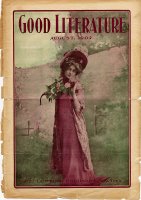
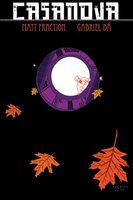
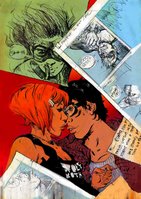 The Escapists #5 (Dark Horse): Well, if you start out with a Paul Pope cover, how can I not like the issue! Jason Shawn Alexander's interior art here is like a blend of Jae Lee and JH Williams, which is something to be admired. This book is just so... GOOD. Vaughan's script has a way of feeling weighty and important without being preachy, and is fun and cool, without being campy or feeling dumbed down. He's able to imbue his characters with such heart, grace, and dignity. Case as Luna Moth? How sweet and endearing is that? If that last page doesn't have some heart, provide commentary on the evolving hero archetype, and just wrip your damn heart out, then I don't know anything about anything. This is just too good. I'm almost speechless. Grade A+.
The Escapists #5 (Dark Horse): Well, if you start out with a Paul Pope cover, how can I not like the issue! Jason Shawn Alexander's interior art here is like a blend of Jae Lee and JH Williams, which is something to be admired. This book is just so... GOOD. Vaughan's script has a way of feeling weighty and important without being preachy, and is fun and cool, without being campy or feeling dumbed down. He's able to imbue his characters with such heart, grace, and dignity. Case as Luna Moth? How sweet and endearing is that? If that last page doesn't have some heart, provide commentary on the evolving hero archetype, and just wrip your damn heart out, then I don't know anything about anything. This is just too good. I'm almost speechless. Grade A+.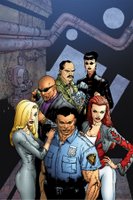


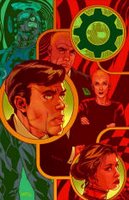
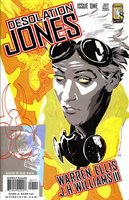 Desolation Jones TPB (DC/Wildstorm): It would have just been too easy to give the Graphic Novel Of The Month nod to the Absolute Sandman Hardcover Edition, but I didn't have to look far to find another extremely worthy contender.
Desolation Jones TPB (DC/Wildstorm): It would have just been too easy to give the Graphic Novel Of The Month nod to the Absolute Sandman Hardcover Edition, but I didn't have to look far to find another extremely worthy contender.